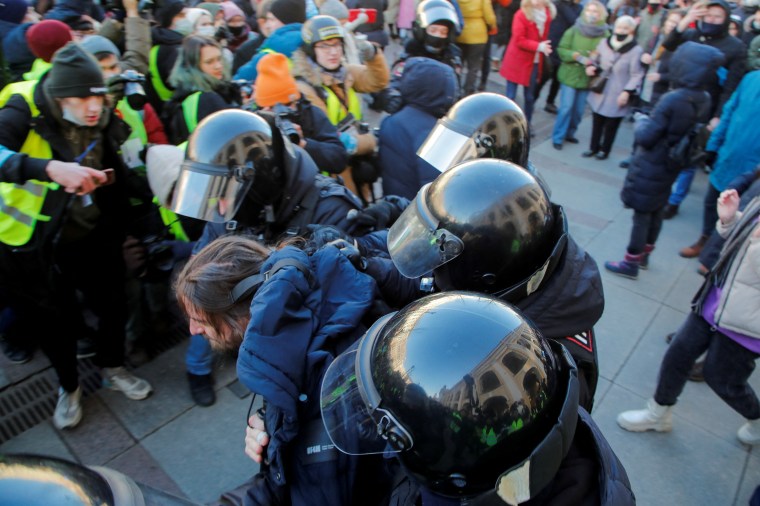Washington, D.C., February 28, 2022 – Russian authorities must allow reporters to do their jobs covering the country’s invasion of Ukraine and protests against the war without fear of punitive retaliation, the Committee to Protect Journalists said Monday.
At least five journalists are facing charges and dozens more were detained across Russia following their coverage of anti-war protests, which have sprung up across the country since Russia launched its invasion of Ukraine on February 24.
Separately, on February 26, Russia’s state internet regulator Roskomnadzor said media organizations can only publish official government reports about the conflict in Ukraine. If outlets fail to comply, Roskomnadzor has threatened to block their websites.
In the same statement, Roskomnadzor announced an administrative investigation into at least 10 independent media outlets for their alleged mischaracterization of Russia’s invasion of Ukraine. The investigations could result in fines up to 5 million rubles, currently the equivalent of US $48,000. (Russia’s currency in flux as international sanctions against the country take hold.)
“Russian authorities should stop employing draconian tactics against independent media as a way to control the narrative around the country’s invasion of Ukraine,” said CPJ Program Director Carlos Martinez de la Serna, in New York. “It is essential that the few remaining independent voices in Russia do not become a casualty in this conflict.”
Roskomnadzor said it is investigating the radio station Echo of Moscow; television station Dozhd TV; independent news websites InoSMI, Medizona, New Times, Free Press, Novaya Gazeta, The Journalist, Linizdat, and the U.S. Congress-funded Radio Free Europe/Radio Liberty website Krym.Realii. CPJ emailed Roskomnadzor’s press office for comment but did not receive a reply.
The following journalists are facing charges after being arrested while covering anti-war protests across Russia:
- Gleb Sokolov, a correspondent with independent news website Sota.Vision, was detained by law enforcement in Moscow on February 25. He was released and charged under Part 5, Article 20.2 of the federal Administrative Code for allegedly participating in the demonstration, according to Sokolov’s editor, Alexei Obukhov, who corresponded with CPJ by messaging app. The charge carries a penalty of between 10,000 rubles (US$93) and 20,000 rubles (US$186) or compulsory work for up to 40 hours.
- Nika Samusik, a photographer for Sota.Vision, was detained by law enforcement officials in St. Petersburg on February 24. She was held in police custody for two nights and was charged under Part 2, Article 20.2 of the Administrative Code for allegedly organizing the protest, according to Obukhov. The charge carries a fine of 20,000 (US$186) to 30,000 (US$280) rubles, 15 hours of labor, or up to 10 days of administrative arrest.
- Viktoria Avdeeva, a reporter with local news website Simirsk.City, was detained by law enforcement in the city of Ulyanovsk, approximately 500 miles east of Moscow, on Sunday, February 27. She was also charged under Part 5, Article 20.2 of the Administrative code, according to Radio Svoboda, the Russian Service of RFE/RL. CPJ was unable to independently confirm Avdeeva’s detention.
- Igor Ulitin, a reporter for local newspaper Narodnaya Gazeta, was detained by law enforcement in Ulyanovsk on Sunday and charged under Part 5, Article 20.2, according to Radio Svoboda. CPJ was unable to independently confirm Ulitin’s detention.
- Maksim Kuznetsov, a reporter for the online news website 73 online, was detained by law enforcement in Ulyanovsk on Sunday. He was charged under Part 5, Article 20.2, according to Radio Svoboda. CPJ was unable to independently confirm Kuznetsov’s detention.
CPJ is working to confirm reports that 31 other reporters have been detained by law enforcement across Russia and determine who is facing charges. CPJ’s Facebook and WhatsApp messages to Narodnaya Gazeta and 73 online, and emails to Simirsk.City went unanswered.
[Editors’ note: The outlet names listed in this article’s sixth paragraph have been changed to match CPJ’s standard romanizations of their names.]
